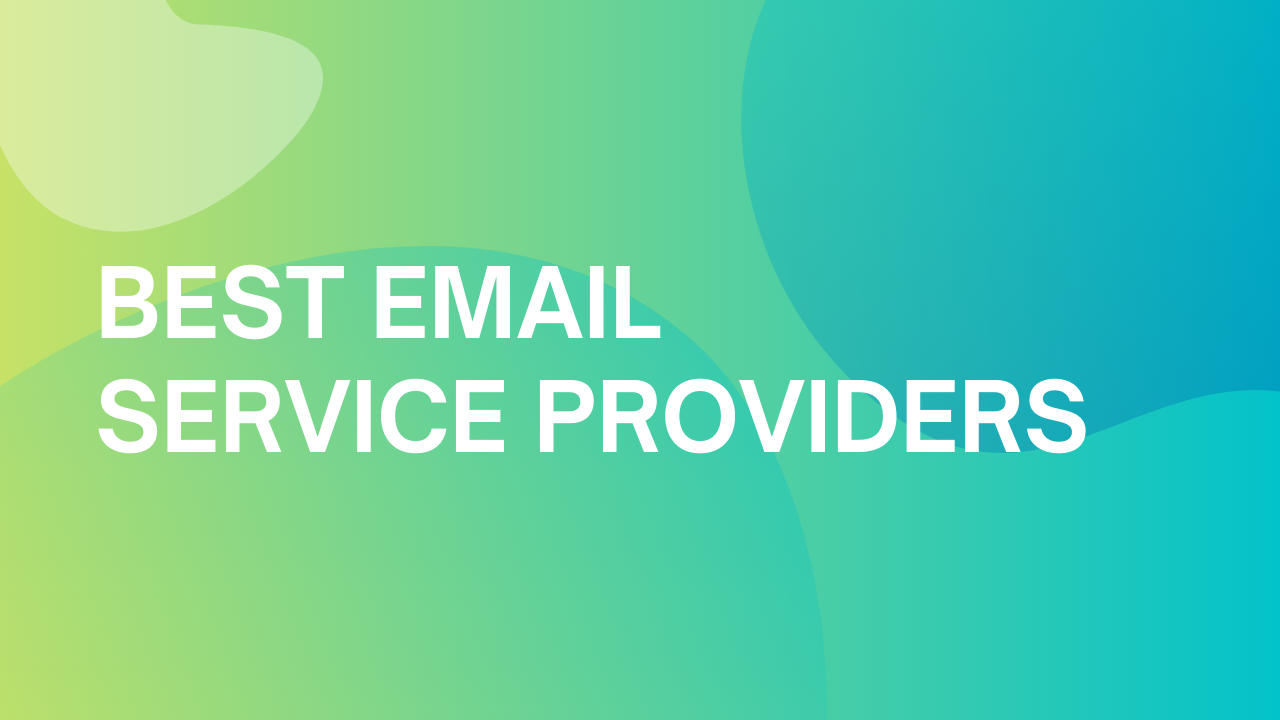
Best Email Service Providers in 2025
Email is an absolute must-have for both personal and business communication. However, choosing the right provider can have a ripple effect on your productivity, security, and overall email experience.
Several email service providers (ESPs) stand out for their features, security measures, storage options, and pricing plans.
This guide will help you navigate through the best options available, catering to various needs from personal use to business requirements.
Whether you’re looking for beefed-up security, integration with other programs, or extensive storage, there’s an email service provider for everyone.
Ready to learn more about the top ESPs available today? Let’s get going!
1. Gmail

Gmail, developed by Google, is a popular email service known for its user-friendly interface and integration with other Google services like Google Drive, Google Calendar, and Google Docs.
It offers 15 GB of free storage, which is shared with other Google services.
Gmail features strong security measures such as two-factor authentication, spam filtering, and confidential mode, which allows users to set expiration dates for emails.
| Gmail Metrics | Details |
| Key features | Integration with Google services, smart replies, spam filter, email scheduling, and offline mode |
| Mailbox sizes | 15 GB (shared with other Google services) |
| Sending limits | 5,000 |
| Security measures | 2FA, encryption, phishing protection |
| Pricing | Free account; starting at $6/user/month for business plans |
| Pros | Robust integration, extensive storage, smart features |
| Cons | Shared storage with other Google services, ads in free version |
2. Mailgun

Mailgun is primarily an email delivery service designed for developers. It offers powerful APIs to send, receive, and track emails.
Mailgun is known for its high deliverability rates and detailed analytics.
It’s a great choice for businesses needing to handle large volumes of transactional and marketing emails.
| Mailgun Metrics | Details |
| Key features | Powerful API for bulk emails, analytics, email validation |
| Mailbox sizes | Not intended for email storage |
| Sending limits | 300 per day in free plan, unlimited in paid |
| Security measures | SSL/TLS encryption, dedicated IPs |
| Pricing | Free tier; 1 month free; paid plans start at $35/month |
| Pros | Developer-friendly, scalable, analytics features |
| Cons | Dashboard can be complex for some, no bounce back to sender |
3. Zoho Mail

Zoho Mail is part of the Zoho suite of productivity tools. It offers a clean, ad-free interface and integrates well with other Zoho applications.
Zoho Mail provides features like calendar, tasks, and notes, making it good for business use.
It also supports custom domain email hosting, which is a major plus for professional users.
| Zoho Mail Metrics | Details |
| Key features | Integration with Zoho apps, ad-free, collaboration tools |
| Mailbox sizes | 5 GB for free plan, 10 GB or more for paid plans |
| Sending limits | 200 per day Standard, 500, 1,000, and 2,000 for paid tiers |
| Security measures | 2FA, encryption |
| Pricing | Free tier; paid plans from €.90/user/month |
| Pros | Ad-free, business integrations like calendar and meeting software, very affordable |
| Cons | Limited storage on free plan, some advanced features require paid plans, spam filters can be a little too strong |
4. Titan

Titan is an email service designed specifically for businesses, offering features like email templates, follow-up reminders, and read receipts.
It provides a professional email experience with seamless integration into business workflows.
Titan focuses on increasing your productivity and email efficiency.
| Titan Metrics | Details |
| Key features | Built-in calendar, contact management, advanced search |
| Mailbox sizes | Not specified |
| Sending limits | 300-1,000 free, unlimited on paid domain |
| Security measures | SSL/TTLS encryption, spam protection |
| Pricing | Based on partner choice |
| Pros | Business-focused features, affordable, advanced automation features |
| Cons | Not sold directly to users, some report issues with the search option |
5. Outlook

Outlook, part of Microsoft’s Office suite, is a comprehensive email service with a strong focus on integration with other Microsoft products.
It offers 15 GB of free storage and features like Focused Inbox, calendar, and task management.
Outlook is suitable for both personal and business use, providing a professional email environment.
| Outlook Metrics | Details |
| Key features | Integration with Microsoft Office, focused inbox, calendar, Microsoft 365 features |
| Mailbox sizes | 15 GB for free, 50 GB or 100 GB for paid plans |
| Sending limits | 5,000 |
| Security measures | 2FA, encryption, phishing detection |
| Pricing | Free, Microsoft 365 plans start at $99.99/year for 2-6 users |
| Pros | Strong Microsoft integration, feature rich |
| Cons | Storage shared with OneDrive, search feature issues widely known, high price point |
6. AOL Mail

AOL Mail is a longstanding email service that offers a user-friendly interface and unlimited storage.
It includes basic features like a calendar and spam protection, making it a good option for personal use.
While it has declined in popularity, AOL Mail still maintains a loyal user base.
| AOL Mail Metrics | Details |
| Key features | Unlimited storage, simple interface, AIM integration |
| Mailbox sizes | Unlimited (1 TB for new accounts) |
| Sending limits | 100 recipients per message, 500 recipients per connection |
| Security measures | SSL encryption, spam protection |
| Pricing | Free with ads, plans start at $4.99/month |
| Pros | Unlimited storage, easy to use |
| Cons | Ads in free version, limited advanced features |
7. Neo

Neo is designed for small businesses and entrepreneurs, offering professional email services with AI-powered tools.
It features Smart Write, which assists in drafting emails and integrates well with other business tools.
Neo is great for users who need a modern, efficient email service.
| Neo Metrics | Details |
| Key features | AI writing assistance, domain-based emails, scheduling, email templates |
| Mailbox sizes | 10 GB, 50 GB, 100 GB |
| Sending limits | 25 hourly, 50 per day |
| Security measures | 2FA and encryption, spam and virus protection |
| Pricing | Plans start at $1.99/mailbox/month with limited features |
| Pros | Business-oriented, AI features, tracking and campaign features |
| Cons | No free tier, some features limited to higher plans |
8. ProtonMail

ProtonMail is known for its focus on security and privacy. Based in Switzerland, it offers end-to-end encryption for all emails, ensuring that only the sender and recipient can read the messages.
ProtonMail is ideal for users who prioritize privacy and security in their email communications.
| ProtonMail Metrics | Details |
| Key features | End-to-end encryption, anonymous sign-up, self-destructing emails |
| Mailbox sizes | 1 GB (free), 15 GB, 500 GB, 3 TB (paid plans) |
| Sending limits | 150 for free, limits vary on your reputation |
| Security measures | End-to-end encryption, 2FA, PhishGuard |
| Pricing | Free; paid plans start at €5/month |
| Pros | High security, privacy-focused, anonymous sign up, self-destructing emails |
| Cons | Limited storage on free plan, no third-party client integration |
9. GMX

GMX Mail offers a solid and free email service with 65 GB of storage and support for large attachments.
It includes features like a calendar and mobile access.
GMX Mail is suitable for personal and business use, providing a reliable and secure email experience.
| GMX Metrics | Details |
| Key features | Large storage, 50 MB attachments, multiple aliases, online calendar |
| Mailbox sizes | 65 GB |
| Sending limits | Unspecified |
| Security measures | Spam and virus protection, encryption, 2FA, SSL |
| Pricing | Free |
| Pros | Large storage, easy to use, available for free |
| Cons | Ads in free version, limited advanced features, not available in all countries |
10. Yahoo

Yahoo Mail is a veteran in the email service industry, offering 1 TB of free storage and a user-friendly interface.
It includes features like disposable email addresses and integration with other Yahoo services.
Yahoo Mail is suitable for both personal and business use.
| Yahoo Mail Metrics | Details |
| Key features | Large storage, basic free email addresses, customization options |
| Mailbox sizes | 1 TB |
| Sending limits | Undisclosed by Yahoo |
| Security measures | Spam and virus protection |
| Pricing – free and/or paid versions | Free with ads; free trial; plans start at $5/month |
| Pros | Huge storage, customizable interface |
| Cons | Ads in free version, history of security breaches |
11. iCloud

iCloud Mail, part of Apple’s ecosystem, offers a clean, ad-free experience with strong integration across Apple devices.
It provides 5 GB of free storage, shared with other iCloud services.
| iCloud Metrics | Details |
| Key features | Integration with Apple services, custom domain, ad-free |
| Mailbox sizes | 5 GB (free), 50 GB, 200 GB, 2 TB, 6 TB, 12 TB (paid) |
| Sending limits | 1,000 |
| Security measures | 2FA, data encryption, Mail Privacy Protection feature |
| Pricing | Free with 5 GB; paid plans from $0.99/month |
| Pros | Complete integration with Apple, easy to use, very reliable |
| Cons | Requires Apple device for optimal use |
12. Mail.com

Mail.com is a versatile email service with various domain options, making it unique for both personal and professional use.
It provides a large mailbox and supports significant attachment sizes.
| Mail.com Metrics | Details |
| Key features | Multiple domain options, online office suite, large attachments |
| Mailbox sizes | 65 GB |
| Sending limits | Unspecified and adjusted by anti-spam team |
| Security measures | 2FA, spam and virus protection, SSL/TLS encryption |
| Pricing | Free with ads; paid plans starting at $9.99/month |
| Pros | Versatile domain options, large storage, cloud features |
| Cons | Ads in free version, limited advanced features, not available in all countries |
Integrate your inboxes with Warmup Inbox
Warmup Inbox is a game-changer for email deliverability, making sure your messages land in the inbox rather than the spam folder.
By simulating natural email interactions, it gradually increases your email volume, building a positive sender reputation and priming your email for marketing campaign success.
- Better deliverability: Makes sure your emails reach the inbox.
- Improved sender reputation: Builds trust with email providers.
- Comprehensive reports: Provides insights into your email performance.
Compatible email providers
Warmup Inbox works with these major email providers.
Don’t let your emails get lost in the spam folder! Sign up for Warmup Inbox today and start seeing better results from your email campaigns!



